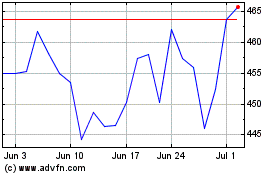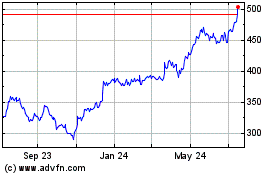By Michael Wursthorn
Health-care stocks have emerged as market leaders in the third
quarter, helping push major U.S. indexes to new highs.
One reason: money managers are embracing the sector as a safety
play, particularly after big technology stocks stumbled in
September.
The S&P 500's health-care sector is the best performer of
the index's 11 groups in the third quarter, up 13% and on pace for
its strongest showing in more than five years. On a year-to-date
basis, health-care stocks are trailing only the technology and
consumer-discretionary sectors.
Hedge funds have built up their biggest position in health-care
shares of the past five years. About 17% of their assets are in the
sector, second only to shares of tech companies, according to
Goldman Sachs Group Inc. data through June. Mutual-fund managers
have also been shifting into health-care stocks, with many building
outsize positions, according to Goldman's data.
And flows into health-care-focused mutual funds and
exchange-traded funds, which are popular with retail investors, are
at their strongest in three years, according to Morningstar
Inc.
Rising interest in the stocks coincides with surging profits
across the industry. Plus, the health-care needs of an aging
population are expected to insulate the companies from a downturn,
and investors searching for attractively valued stocks after a
nine-year bull market in the U.S. have embraced the shares.
The sector's rally has been broad, with shares of pharmaceutical
giants like Merck & Co. and Pfizer Inc., insurers including
Humana Inc. and UnitedHealth Group Inc., and equipment suppliers
like Abiomed Inc. and Align Technology Inc. all rising at least 20%
in 2018.
"These stocks had been out of favor for a while," said Tom
Hancock, head of focused equity at Grantham, Mayo, Van Otterloo
& Co., the Boston-based money-management firm founded by famed
investor Jeremy Grantham.
"But we've been trying to find stocks that aren't being inflated
by this rising tide of economic good news," Mr. Hancock added,
referring to the strong U.S. growth that has helped fuel a broad
stock-market upswing in recent years. "When that tide recedes,
we're looking for companies that will be OK in that
environment."
Big tech stocks that have led much of this year's rally,
including Amazon.com Inc., Google parent Alphabet Inc. and Apple
Inc., which each fell more than 3% in September. Investors have cut
their exposure amid concerns about new regulations in the wake of
Facebook Inc.'s data mishap.
At firms like GMO, investors have been trimming their technology
holdings to help fund their shifts into health care. GMO's funds
recently initiated a position in Merck, Mr. Hancock said, as the
pharmaceutical giant has focused on further developing
cancer-treatment drug Keytruda, which accounted for about 9% of the
company's total revenue last year. Merck shares have surged 26%
this year and 16% in the third quarter alone.
GMO funds, meanwhile, trimmed stakes in Alibaba Group Holding
Ltd. and Microsoft Corp. in the past six months, according to
FactSet.
Similarly, hedge-fund manager Tudor Investment Corp. increased
its stake in health insurer Aetna Inc. and initiated new positions
in drugmakers Shire PLC and AbbVie Inc. all in the last six months,
according to fund-holdings data compiled by FactSet. Millennium
Management LLC, another hedge fund, added to its positions in
medical-device makers Medtronic PLC and Boston Scientific Corp.
Tudor declined to comment through a spokesman. Millennium didn't
respond to a request for comment.
Some investors, though, question the timing of health care's
sudden appeal, citing its bouts of volatility when political
debates over how Americans pay for health care intensify. The
sector will likely see another jolt should Republicans retain
control of Congress in November's midterm elections and resume
talks of a health-care overhaul, said Lewis Piantedosi, a vice
president and portfolio manager for Eaton Vance Management, which
has kept its allocation toward health-care stocks below its
benchmark.
Still, the broader shift into health-care stocks suggests
investors are eschewing risk after a long rally. Although the tax
cut enacted in December led to an explosion in corporate profits
that fueled the latest leg of the rally, Wall Street analysts and
economists are increasingly convinced that the U.S. economy will
start contracting as early as 2020.
Investors tend to view health-care stocks as a defensive
investment because health insurers, pharmaceutical companies and
medical-device makers usually hold up better in times of economic
turbulence. That is because most medical expenses can't be put off
in a recession, and economic swings don't typically curb the
rollout of new drugs and devices. Valuations are also enticing,
investors said, with health-care stocks in the S&P 500 trading
in line with the broader S&P 500 at about 17 times future
earnings, compared with 18 times for the tech sector and 23 times
for consumer-discretionary companies, according to FactSet.
Biotech firms, however, are viewed as riskier and aren't getting
nearly as much attention from big money managers, some investors
said, because those stocks can move dramatically based on drug
approvals. Biotech shares in the S&P 500 aren't seeing the same
bump as pharmaceutical giants, insurers and medical suppliers.
"Not to say it can't continue, but we're in the longest bull
market ever, " said Matthew Watson, a portfolio manager and
assistant vice president at James Advantage Funds, a mutual-fund
manager that has boosted its positions in health-insurer Anthem
Inc. and drugmaker Pfizer. "So from a risk standpoint, getting into
health-care stocks, which tends to be defensive, makes sense for us
too."
Write to Michael Wursthorn at Michael.Wursthorn@wsj.com
(END) Dow Jones Newswires
September 25, 2018 17:25 ET (21:25 GMT)
Copyright (c) 2018 Dow Jones & Company, Inc.
Goldman Sachs (NYSE:GS)
Historical Stock Chart
From Mar 2024 to Apr 2024

Goldman Sachs (NYSE:GS)
Historical Stock Chart
From Apr 2023 to Apr 2024
